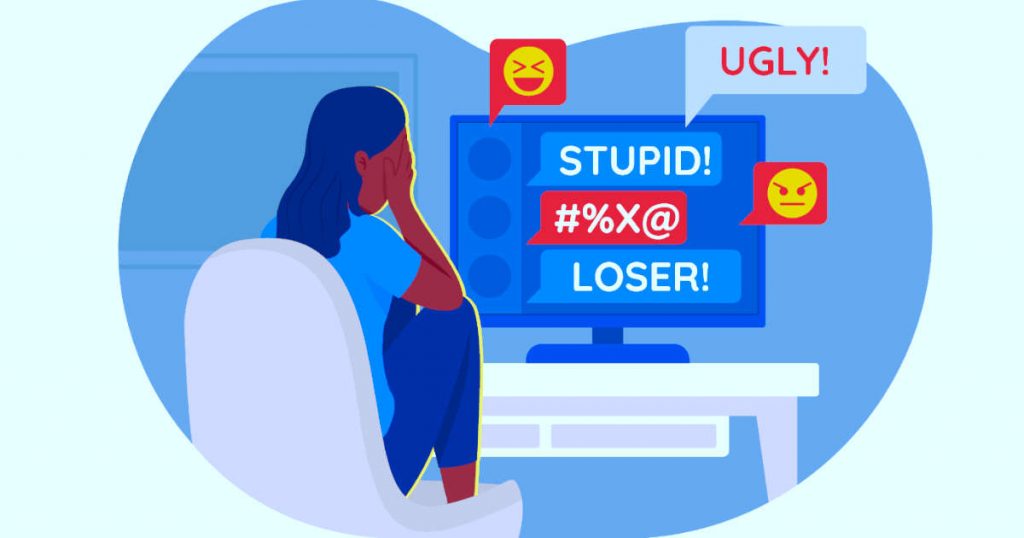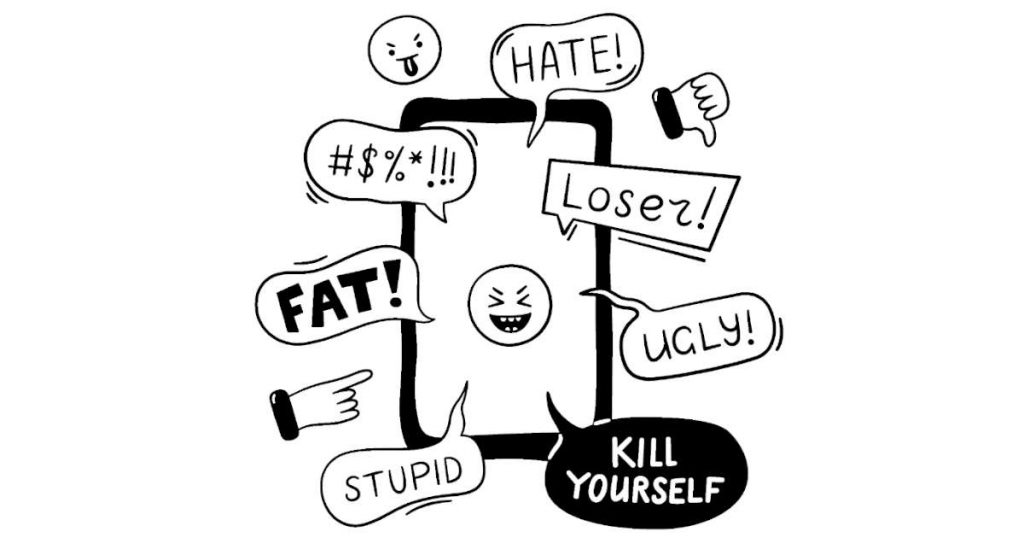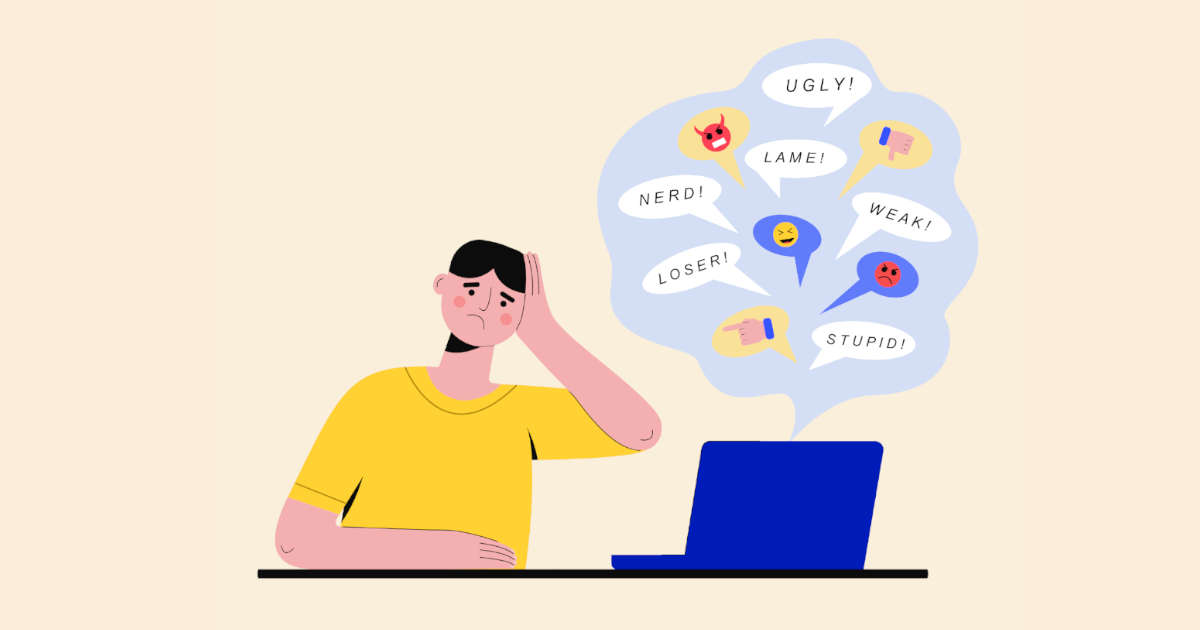Cyberbullying can be defined as digital bullying that occurs on social networking sites, instant messengers, gaming platforms, and mobile phones. This is repetitive behaviour designed to frighten, anger, or shame the target. Examples of cyberbullying include:
- Spreading false information about the victim or publication of compromising photos and videos of the target on social networks;
- Sending a victim abusive or threatening messages, images or videos;
- Sending abusive messages to the victim on someone else’s behalf or through fake accounts.
Unlike real-life bullying, cyberbullying leaves a digital trail on the internet, which can be used as evidence to prevent violence.
Am I bullied online? How to distinguish a joke from bullying?
All friends joke with each other, but sometimes it’s hard to understand if someone is simply having fun or attempting to harm you, especially online.
If the joke offended you or you think others are laughing at you and not with you, the joke has gone too far. If this persists after you have requested to stop, it may be considered cyberbullying. If you feel bad and it does not stop, you should seek help.
What can cyberbullying lead to?
When you are bullied online, it might feel like you are being targeted everywhere, even in your own home. There seems to be no way out. This can continue for a long period and influence the person in a variety of ways:
- Mentally: anxiety, a feeling of fear or anger;
- Emotionally: feeling embarrassed or losing interest in things you enjoy;
- Physically: fatigue, insomnia, abdominal pain and headaches.
Feeling like you’re being laughed at or harassed may prevent you from speaking up or trying to solve a problem. Cyberbullying can even lead to suicide in severe circumstances.

How does cyberbullying affect mental health?
If you are experiencing cyberbullying, you may begin to feel the following:
- shame;
- nervousness;
- anxiety;
- Being self-conscious about what others say or think about you. This can lead to alienation from friends and family, negative thoughts and self-talk, constant guilt for one’s actions;
- Loss of motivation to do what you love;
- Frequent absenteeism from school. This common problem stems from cyberbullying that leads to alcohol, drug use, and violent behaviour.
Whom should I contact if I am a victim of cyberbullying?
Seek help from people you trust. It can be:
- parents and family members;
- a school psychologist or your favourite teacher;
- professional consultant of the trust service;
- support service if bullying occurs on the social network;
- the police if you are in immediate danger.
I get cyber bullied, but I’m afraid to talk about it with my parents. How can I talk to them?
If you’re being bullied, one of the most crucial first measures you can take is to talk to an adult you trust.
Choose a time to talk when your parents can listen to you. Explain how serious your problem is. Keep in mind that parents may not understand some aspects of technology. Try to explain to them in simple terms.
How can I help my friends if they are bullied online?
It is important to listen carefully to your friend. Find out why they don’t want to report the bullying to anybody. Explain to him that he doesn’t have to report it, but it’s important to talk to someone who can help.
Help them think about what they can say and to whom. If they decide to report it, offer to accompany them. Most importantly, show them that you are there and want to help.
If your buddy still refuses to report cyberbullying, assist them in contacting a trusted adult to assist them in dealing with the matter. Remember that cyberbullying may have life-threatening effects in some cases.
How to stop cyberbullying without giving up the internet?
If you are being bullied online, you might delete particular applications or temporarily disable your internet connection to allow yourself time to recuperate. But ditching the Internet is not a long-term solution.

How can I prevent my personal information from being used to manipulate or humiliate on social media?
Think twice before sharing anything on digital platforms — it will stay online and can be used against you during bullying. Do not share your personal information with anyone, such as your address, phone number and place of study/work.
Set up the privacy of your social media profile. Here are some things you can do:
- Set up lists of people who can see your profile, send you messages or comment on your posts;
- You can report offensive comments, messages and media files and request their removal;
- You can completely block the offending user so they can no longer send you any messages or comment on your posts.
Is there a penalty for cyberbullying?
Online bullying laws are recent and still do not exist everywhere. Therefore, many countries rely on other relevant laws, such as those against harassment, to punish cyberbullying.
In countries with specific cyberbullying laws, online behaviour that intentionally causes significant emotional distress is considered a criminal activity. In some of these countries, protection is provided to victims of cyberbullying.
Are technology companies obligated to fight online bullying and harassment?
Tech companies are actively fighting the problem of cyberbullying. Many are implementing new tools to protect users, releasing guidelines that describe how to report online abuse.
But these measures are not enough. Young users face bullying daily. Moreover, cyberbullying even drives some people to suicide. Technology companies must protect their users, children and youth. Companies should be held accountable if they fail to fulfil their obligations.
What are the ways to fight cyberbullying?
Each social network offers different privacy settings, allowing you to block a user, hide your page, etc. We wrote about them above. Also, many social networks provide educational tools and recommendations for children, parents and teachers to educate them about the risks and ways to stay safe online.
Also, you can protect someone from online bullying. Think about who in your environment may be a victim of cyberbullying and how you can help them and draw attention to the problem.
In many countries, there is a special helpline where you can call and talk to a psychologist anonymously for free. Stay strong, and talk to someone before it’s too late.
**NOTE: Use the contact information from here to report cyberbullying and online abuse to the relevant social media apps, gaming networks, and associated platforms.






Leave a Comment